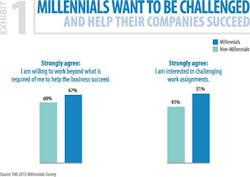It’s no secret that the industrial and manufacturing sectors are set to see a major workforce turnover.
By 2030, all of the baby boomers will be over 65, and hopefully they can start to retire or at least cut back in work. America’s largest generation, the Millennials, or people born between 1980 and 2000, will by then account for the largest share of the workforce. In 2020, the 80 million-person demographic will already account for 50% of the workforce.
The nation will be completely dependent on the work ethic of generation that’s considered lazy, career nomads, selfish, narcissistic, and entitled. Just type in a “Millennial” and any of those words and you’ll find several articles/rants to support or oppose those sentiments.
For every stat, such as narcissistic personality disorder is found nearly three times as often in people currently in their 20s as for the generation that’s now 65 or older (National Institutes of Health), you can find another that calls it b.s. An article in “The Atlantic” says, “according to the APA, only about 1% of people would meet the textbook definition of narcissism.”
Instead, what people often exhibit is a sub-clinical narcissism, which may include annoying-but-harmless activities such as taking selfie or bragging about oneself. These are things we’ve all done at least once, so it’s hard to fault a group of 80 million people for that.
As in every generation, there are some really awful people. Just drive on the highway or walk into a crowded public place and you’ll encounter plenty of all ages, sizes, and races.
But there’s supposed to be something special-- definitely tougher -- about the “blue-collar” worker, the guy or gal who works in hot factories or lays foundation in freezing conditions. And these are the men and woman we will absolutely rely on to truly make America great again.
And these are who consulting firm FMI surveyed to find out what the hardest-working Millennials are made of. Four hundred construction industry professionals, more than half considered Millennials, were surveyed. The results may have you more optimistic about the future state of the workforce.
Millennials Aren’t Lazy
67% of Millennials expressed their willingness to work beyond what is required of them to help the business succeed. That’s 7% higher than non-Millennials.
This may not last if that willingness is overlooked, FMI editor Sabine Hoover believes.
“Failing to nurture the innovative and inquisitive nature of younger workers will create disengagement among employees and result in a less productive workforce over time,” she writes.
Millennials Don’t Seek to Job Hop
The survey found that millennials are 25% more likely to stay longer with the company when its vision is inspiring and clearly communicated vision, compared to those who don’t understand the company’s vision and direction.
They also value a workplace that offers them the ability to work with innovative processes to solve problems and challenges. If you have a lot of Millennial employees leaving too soon, it may mean you need to update some work practices.
Millennials Value Money Just as Much as You
They may get a lot of press for “Feeling the Bern” and having socialist leanings, but at least those Millennials surveyed say competitive pay is the highest concern.
Generational expert Haydn Shaw confirmed these findings.
“The vast majority of surveys show that millennials rank base pay as the most important factor in selecting and staying in a job, just as the other three generations do,” he says.
Millennials Don’t Need Constant Approval, but Monthly Would Be Nice
Despite what their Facebook and Instagram accounts imply, Millennials don’t need constant ego stroking. As far as performance feedback is concerned, 48% would like monthly updates on how they are doing from their supervisor, while 5% want it daily.
Millennials Aren’t Entitled*
(*Not a Typo)
There’s entitled, and then there’s deserving. It’s easy to confuse the two based on how big your office is.
When the participants indicated they understood their career paths and opportunities within their firms, 81% expected to stay at their company more than five years. Of those that said they wouldn’t, 33% weren’t sure of their current roles, responsibilities and expectations.
So overall, Millennials don’t feel entitled to a promotion, but if they stay loyal and achieve their stated goals, they will feel deserving of one… or they’ll find a place that will.
For a full recap of FMI’s survey, visit here.
And to sound off on what you think of Millennials, use the comment section below. (No hashtags needed.)












